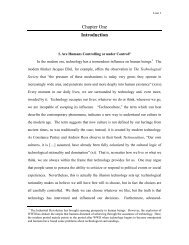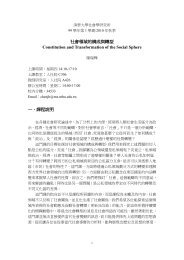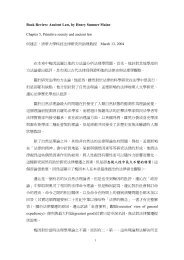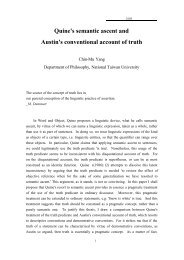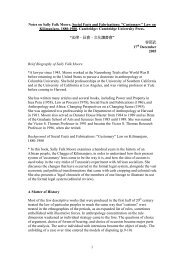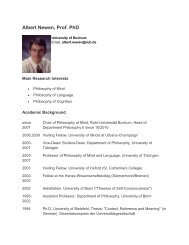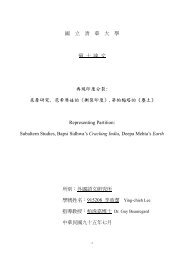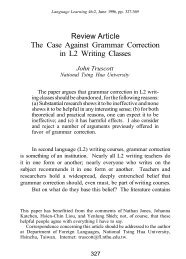Effects of Graded Texts on EFL College Students' Incidental ...
Effects of Graded Texts on EFL College Students' Incidental ...
Effects of Graded Texts on EFL College Students' Incidental ...
You also want an ePaper? Increase the reach of your titles
YUMPU automatically turns print PDFs into web optimized ePapers that Google loves.
immediately after reading, <strong>on</strong>e week after reading, and <strong>on</strong>e m<strong>on</strong>th after reading,<br />
aiming to measure learners’ productive and receptive gain and word retenti<strong>on</strong>. The<br />
results indicated that <strong>on</strong>ly two encounters with unfamiliar words during reading can<br />
positively affect learners’ vocabulary growth. Yet, learners with six exposures did<br />
significantly better <strong>on</strong> both immediate, delayed receptive and productive vocabulary<br />
tests whereas two and four exposures resulted in a small difference. The findings<br />
first suggested that l<strong>on</strong>g term effect <strong>on</strong> adult L2 vocabulary growth during reading can<br />
be guaranteed under the c<strong>on</strong>diti<strong>on</strong> that texts are sufficiently rich for building<br />
vocabulary knowledge. Moreover, though two exposures during reading already<br />
result in word knowledge gain, lexical growth is more likely to be speeded up if the<br />
exposure is increased to six encounters.<br />
The major reas<strong>on</strong> leading to these disparate results with measuring encounters is<br />
the incremental nature <str<strong>on</strong>g>of</str<strong>on</strong>g> word learning process. A single encounter with a word in<br />
c<strong>on</strong>text could already result in some amount <str<strong>on</strong>g>of</str<strong>on</strong>g> learning, while 50 exposures will still<br />
not enable learners to build the complete and complex word knowledge needed for<br />
productive use. As Huckin and Coady (1999) stressed “word-learning outcomes can<br />
range over c<strong>on</strong>tinua <str<strong>on</strong>g>of</str<strong>on</strong>g> lexical knowledge and use competencies from partial<br />
recogniti<strong>on</strong> knowledge to precise knowledge and productive use capability” (p. 185).<br />
In other words, researchers’ c<strong>on</strong>cepts <str<strong>on</strong>g>of</str<strong>on</strong>g> successful acquisiti<strong>on</strong> were different, and<br />
thus, vocabulary learning was measured in different ways.<br />
The other possibility involved in measuring word encounter frequency could be<br />
that different degree <str<strong>on</strong>g>of</str<strong>on</strong>g> exposure is needed by different learners (Zahar, et al., 2001).<br />
Zahar, Cobb, and Spada (2001) investigated the issue by recruiting 144 ESL learners<br />
coming from a variety <str<strong>on</strong>g>of</str<strong>on</strong>g> first language backgrounds at five pr<str<strong>on</strong>g>of</str<strong>on</strong>g>iciency levels ranging<br />
from beginners to bilinguals. Each student’s performance <strong>on</strong> Nati<strong>on</strong>’s (1990)<br />
Vocabulary Levels Test involving matching words to brief definiti<strong>on</strong>s at five<br />
20



